外研高中英语必修4Module 1 Life in the future reading(共54张PPT)
文档属性
| 名称 | 外研高中英语必修4Module 1 Life in the future reading(共54张PPT) | 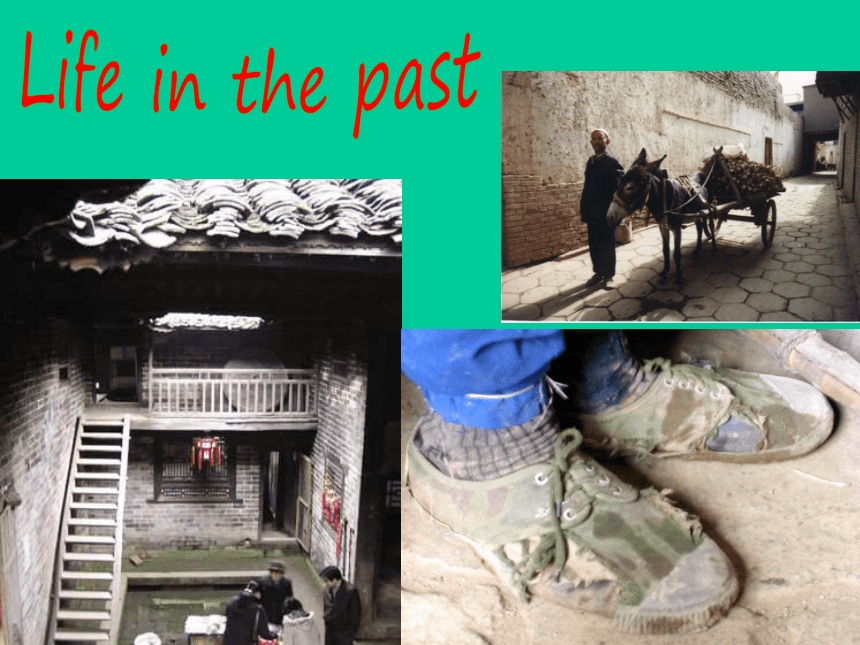 | |
| 格式 | zip | ||
| 文件大小 | 4.1MB | ||
| 资源类型 | 教案 | ||
| 版本资源 | 外研版 | ||
| 科目 | 英语 | ||
| 更新时间 | 2020-04-24 20:00:14 | ||
图片预览

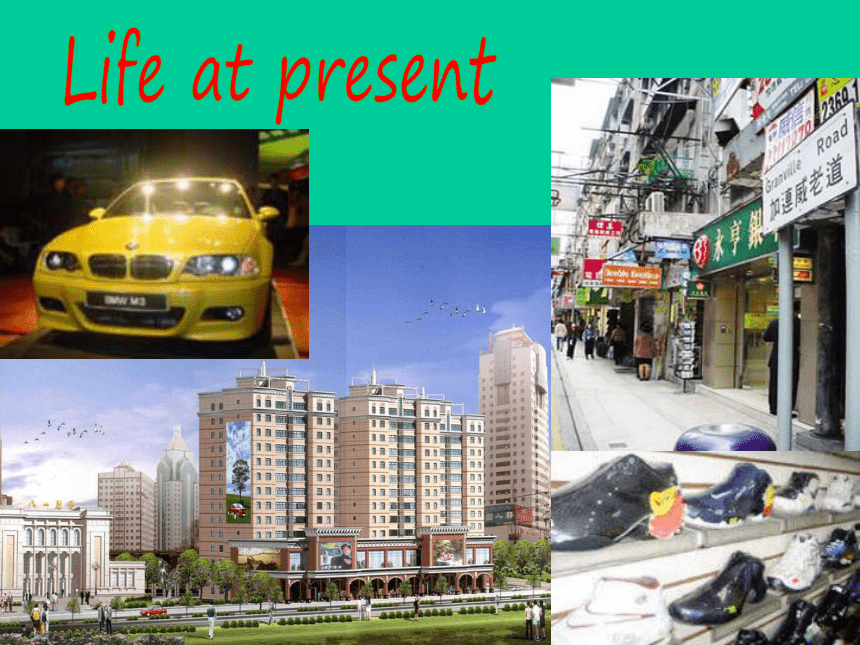

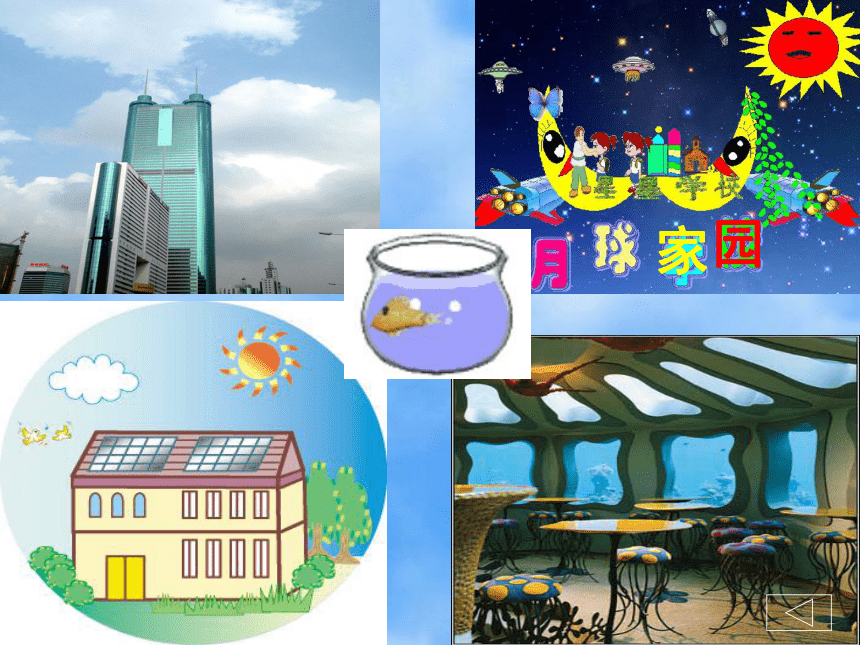
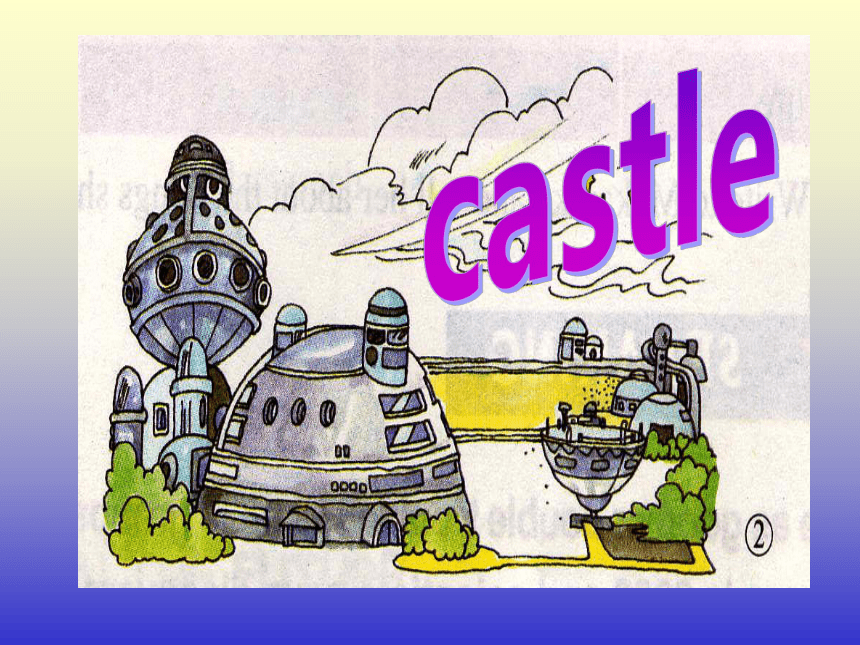
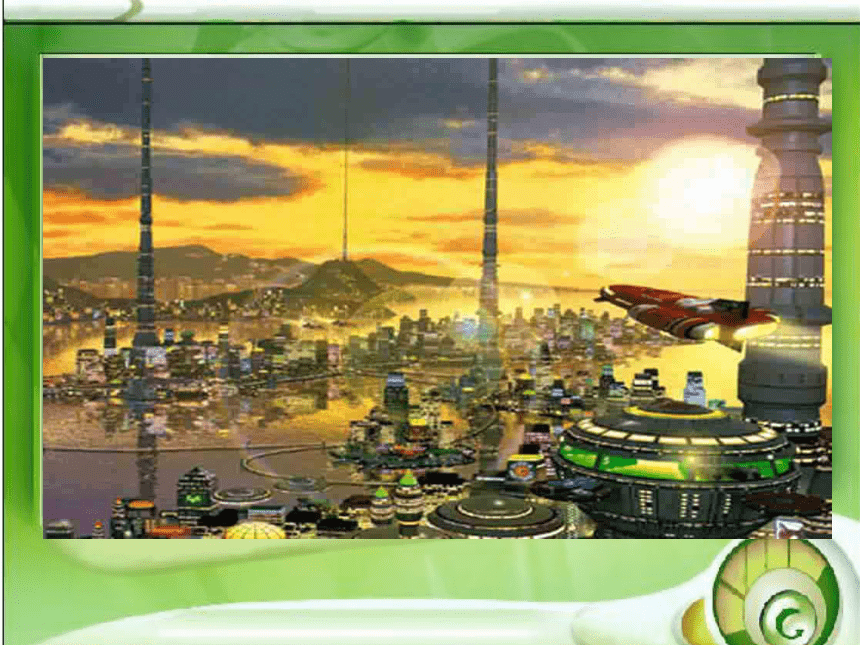
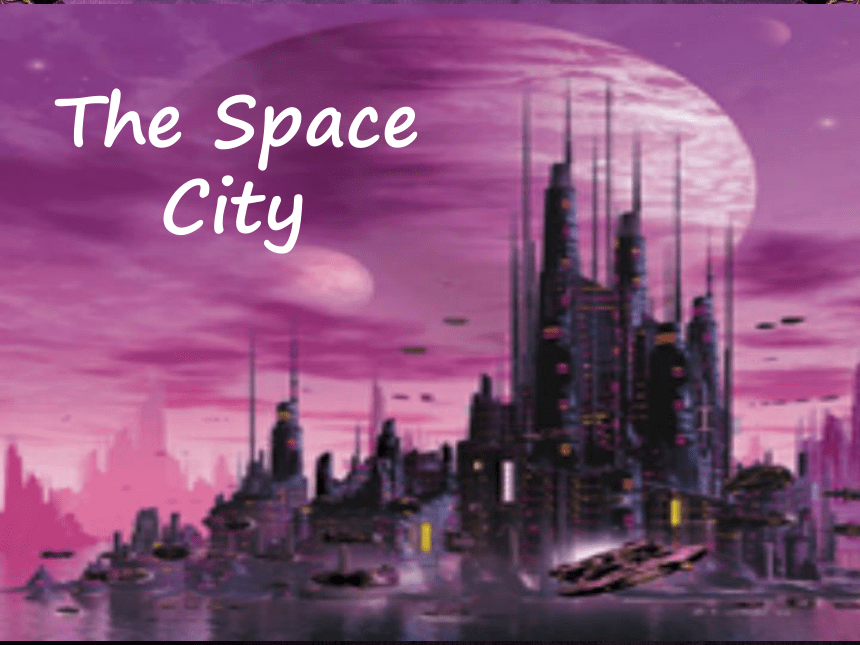

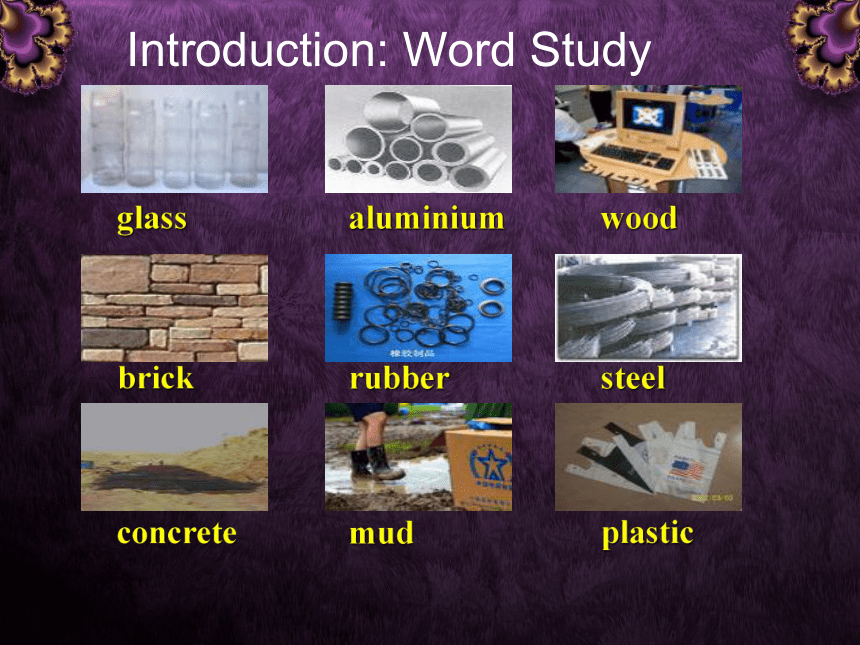
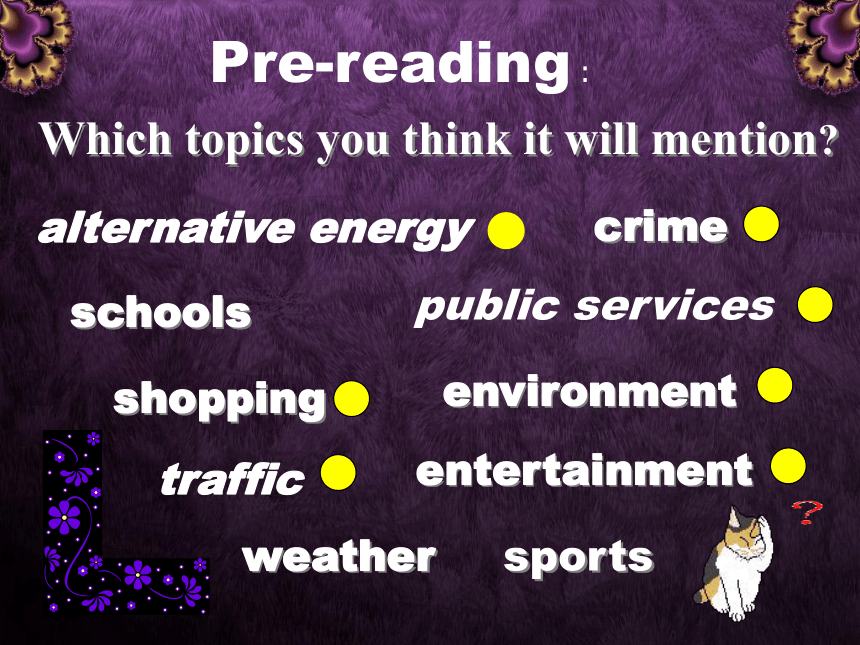
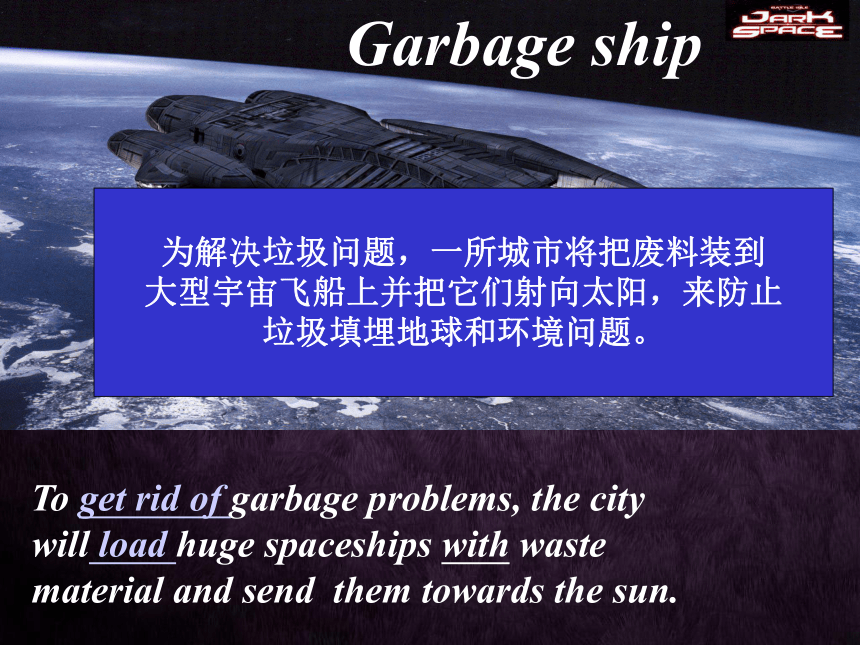

文档简介
(共54张PPT)
What life will be like in the future?
家
园
The Space City
The Space House
Introduction: Word Study
glass
aluminium
wood
brick
rubber
steel
concrete
mud
plastic
Which topics you think it will mention?
entertainment
shopping
weather
schools
sports
crime
environment
Pre-reading :
alternative energy
public services
traffic
Garbage ship
To get rid of garbage problems, the city
will load huge spaceships with waste
material and send them towards the sun.
为解决垃圾问题,一所城市将把废料装到
大型宇宙飞船上并把它们射向太阳,来防止
垃圾填埋地球和环境问题。
Police will arrest criminals by
firing nets instead of guns.
No smoking will be allowed
within a future city`s limits.
禁止吸烟将在未来城市的限制中被许可。
All shopping will be done on line.
mall
and catalogues will have
voice commands to
place orders.。
由声音指令来订购目录。
videophone
Everyone will be given telephone
number at birth that will never changed
no matter where they live.
All forms of recreation
will be provided free of charge
recreation
softball
bowling
娱乐,消遣
All cars will be
powered by electricity.
car using solar energy
Distance surgery will become common as
doctors carry out operations from
thousands of miles away.
surgery
外科手术
telesurgery
远距离手术
People with disabilities
senior citizens
will be able to go
anywhere in the world
using high-tech cameras
attached to their head.
space travel
Travelling in space
by ordinary citizens
will be common.
for sure
肯定;一定;必定
1, That is for sure.
那是一定的。
2, He will be sick for sure.
他一定回生病的。
sure
certain
肯定
常可换用,而certain更肯定
不是人做主语时,只能用certain
1,I am ____________ about it.
2, We are _____________of victory.
3, It is _______ to rain.
sure/ certain
sure/ certain
sure
Language points for Reading
care
1) n.
爱护,关心,关爱
1,Take care of
your brother while I am away.
我不在的时候,照顾好你弟弟。
2, with care.
过马路要留神。
2) vi.
关心;担心,介意
1,I don`t care about your opinion.
我不在乎你的意见。
关怀,照顾
2,He care for no one.
他谁也不顾。
Cross the road
run out
用完,耗尽
1, Our supplies finally run out.
我们的物质终于用完了。
他的钱很快花完了。
2, His money soon ran out.
run out of
表主动,主语一般是人
他已经花完了钱。
He has run out of money.
run away
逃跑
run after
追逐,追求
= become used up
用完,耗尽
rely on /upon sb./sth.
指望,依赖某人/某物
Nowadays we rely increasingly on computers for help.
现在人们越来越依赖计算机协助工作。
1, I relied on your coming early.
我指望你早来。
2, We can`t relay on her for help.
我们不可能指望她的帮助。
get rid of
处理掉,排除,摆脱
我们得把这些垃圾处理掉。
1,We have to get rid of the rubbish.
他决定改掉坏习惯。
2, He made up his mind to get rid of
his bad habit.
3, You must get rid of all your worries
and have a good rest.
你必须排除所有的担心,好好休息一下。
load …with….
把…装进…中
1,load a truck/ a ship /a train with goods.
给卡车 / 轮船 /火车装货
fill… with….
equip…with…
fit …with…
cover…with…
2,We are load with too much homework.
我们要负担太多的作业了。
no matter where they live
= wherever they live
Whatever you say, I won`t believe you.
=No matter what you say, I won`t believe you.
no matter what/ where/ how….
= whatever/ wherever/ however
…will be provided free of charge by the city
charge
1, (货物或服务所需的)费用
1)His charge is reasonable.
他要的费用很公道。
所有食物免费供应。
2) All the food is free of charge.
2, 掌管,照管,监护
Who is in charge here?
这儿谁负责?
The patients are under the charge of Dr.Li.
in charge of 掌管,负责
in the charge of =under the charge of
在…掌管之下,由…负责
5班是由朱老师负责的。
Mr zhu is in charge of class 5.
Class 5 is in(under ) the charge of Mr zhu.
….and it will be possible to change the colour
of cars at the flick of a switch.
at
一….(就会发生 )
1, I will go at your call.
你一叫我我就走。
2, She burst out crying at the news.
她知道消息就放声大哭起来。
将有可能轻击机关就可以改变汽车的颜色。
.using high-tech cameras attached to their head.
通过系在头上的高科技照相机。
attach…to…
把某物系在,缚在或附在…上
be attached to 附属于… 依恋于…
attach a sign on each bag
每个袋子都加上标志
common adj.
普通的,常见的,不足为奇的
ordinary adj.
普通的,平常的,平凡的
侧重“时时发生,人所共有”
含“地位底下”之意
侧重日常的,随时可见的,
含“平淡无奇” 之意
1,That is quite an/a ________ event.
2, He isn`t a hero but just a /an_______ man.
3, An/A _________working day is eight hours.
ordinary
common
ordinary
2. with的复合结构:
He felt safe with his mum standing behind him.
He went to the library with his homework finished.
With a lot of homework to do, he isn’t free.
He is used to sleeping with the windows open.
He likes reading with his MP3 on.
He went out with a stick in his hand.
with + n. + -ed
with + n. + doing
with + n. + to do
with + n. + adj.
with + n. + adv.
with + n. + prep.
What will the city of the future look like?
Garbage ships
Telephones
for life
Batman Nets
Recreation
Forget
smoking
Cars
Forget
the malls
Telesurgery
Holidays
at home
Space travel
arrest
carry out
load
recycle
rely on
waste ( v)
alternative energy
criminals
huge spaceship
material
natural resource
operation
Ask and answer the questions
1,What have students in a Texas university done?
2, Where will garbage ships go?
3, Who will batman nets catch?
4, Where won`t people be allowed to smoke?
5, How will people go shopping?
6, What number will people keep for life?
7, What won`t people have to pay for?
8, How will cars be different?
9, What will doctors do from a distance?
10 Where will old people go without moving?
They`ve thought how to run a city in 2025
To the sun
Criminals
Within a city`s limits
On line
Their telephone number.
Recreation
They will be powered by electricity
Surgery
Anywhere
Work in groups
In your opinion, what life will be like in the future?
Use your imagination as much as possible.
Make predictions for the year 2015.
What will schools be
like in the future?
What subjects will
people study?
School on the air
education
Where will people work
in the future?
What kink of jobs will
people have?
Function
Q: 在英语中,用来表达将要发生的动作或事情有些什么表达方式?
Study:
They will come back next week.
The project will be completed in a month.
Conclusion:
“Will+动词原形”表示在将来某个时间要发生的动作或存在的状态,常与表示将来的时间状语连用。有时也可用来表示揣测。如:The predictions will come true if technology continues to develop.
Study:
Look! It’s going to rain.
They are going to stay for two days.
What are you going to do when you leave school?
Conclusion:
“be going to +动词原形”表示打算在最近或将来要做的事;或表示根据已有的迹象推测很可能要发生的事情。
Study:
When does the summer vacation begin?
My train leaves at ten o’clock.
The department store opens at nine tomorrow morning.
Conclusion:
一般现在时可以表示按计划或时刻要发生的事;只限于某些瞬间动词,如arrive, begin, come, finish, get, go, leave, meet, return, sail, spend, start等。
Function – Activity 2 on Page 4
Match the sentences with the meanings.
Answers:
3
4
2
1
6
5
Function - Activity 3 on Page 5
Work in pairs and try to underline the most appropriate form of the verb.
Answers:
will be like
are you going to do
does the plane arrive
are going to have
is coming
will ring
is going to study
will go
Q: 将来进行时的构成、用法?
Study:
At nine o’clock tonight I will be doing my homework.
In the year 3000 a lot of people will be living on space stations.
Conclusion:
将来进行时由“shall/will+be+现在分词”构成;表示将来某个时刻或某段时间内发生的动作,常与特定的将来时间状语连用。
Grammar:The future continuous
Q: 将来进行时还可以表示什么?
Study:
You needn’t cook supper, Mum. I shall be cooking dinner tonight.
Tom will be telling you about it this afternoon.
表示已经决定或安排要发生的动作或事情
表示预料中要发生的动作
Q: 一般将来时与将来进行时的区别?
Study:
When will you finish the letters?
When will you be seeing Mr White?
Conclusion:
将来进行时表示对将来事实的简单陈述;一般将来时除表示时间概念外,还常带有感彩。
Grammar- Activity 3 on Page 7
Answers:
will be doing
will be getting dressed
won’t be working
will be living
Will, be staying
will be lying
Let’s
work hard
and create
a bright
future.
Wish everybody a beautiful future!
What life will be like in the future?
家
园
The Space City
The Space House
Introduction: Word Study
glass
aluminium
wood
brick
rubber
steel
concrete
mud
plastic
Which topics you think it will mention?
entertainment
shopping
weather
schools
sports
crime
environment
Pre-reading :
alternative energy
public services
traffic
Garbage ship
To get rid of garbage problems, the city
will load huge spaceships with waste
material and send them towards the sun.
为解决垃圾问题,一所城市将把废料装到
大型宇宙飞船上并把它们射向太阳,来防止
垃圾填埋地球和环境问题。
Police will arrest criminals by
firing nets instead of guns.
No smoking will be allowed
within a future city`s limits.
禁止吸烟将在未来城市的限制中被许可。
All shopping will be done on line.
mall
and catalogues will have
voice commands to
place orders.。
由声音指令来订购目录。
videophone
Everyone will be given telephone
number at birth that will never changed
no matter where they live.
All forms of recreation
will be provided free of charge
recreation
softball
bowling
娱乐,消遣
All cars will be
powered by electricity.
car using solar energy
Distance surgery will become common as
doctors carry out operations from
thousands of miles away.
surgery
外科手术
telesurgery
远距离手术
People with disabilities
senior citizens
will be able to go
anywhere in the world
using high-tech cameras
attached to their head.
space travel
Travelling in space
by ordinary citizens
will be common.
for sure
肯定;一定;必定
1, That is for sure.
那是一定的。
2, He will be sick for sure.
他一定回生病的。
sure
certain
肯定
常可换用,而certain更肯定
不是人做主语时,只能用certain
1,I am ____________ about it.
2, We are _____________of victory.
3, It is _______ to rain.
sure/ certain
sure/ certain
sure
Language points for Reading
care
1) n.
爱护,关心,关爱
1,Take care of
your brother while I am away.
我不在的时候,照顾好你弟弟。
2, with care.
过马路要留神。
2) vi.
关心;担心,介意
1,I don`t care about your opinion.
我不在乎你的意见。
关怀,照顾
2,He care for no one.
他谁也不顾。
Cross the road
run out
用完,耗尽
1, Our supplies finally run out.
我们的物质终于用完了。
他的钱很快花完了。
2, His money soon ran out.
run out of
表主动,主语一般是人
他已经花完了钱。
He has run out of money.
run away
逃跑
run after
追逐,追求
= become used up
用完,耗尽
rely on /upon sb./sth.
指望,依赖某人/某物
Nowadays we rely increasingly on computers for help.
现在人们越来越依赖计算机协助工作。
1, I relied on your coming early.
我指望你早来。
2, We can`t relay on her for help.
我们不可能指望她的帮助。
get rid of
处理掉,排除,摆脱
我们得把这些垃圾处理掉。
1,We have to get rid of the rubbish.
他决定改掉坏习惯。
2, He made up his mind to get rid of
his bad habit.
3, You must get rid of all your worries
and have a good rest.
你必须排除所有的担心,好好休息一下。
load …with….
把…装进…中
1,load a truck/ a ship /a train with goods.
给卡车 / 轮船 /火车装货
fill… with….
equip…with…
fit …with…
cover…with…
2,We are load with too much homework.
我们要负担太多的作业了。
no matter where they live
= wherever they live
Whatever you say, I won`t believe you.
=No matter what you say, I won`t believe you.
no matter what/ where/ how….
= whatever/ wherever/ however
…will be provided free of charge by the city
charge
1, (货物或服务所需的)费用
1)His charge is reasonable.
他要的费用很公道。
所有食物免费供应。
2) All the food is free of charge.
2, 掌管,照管,监护
Who is in charge here?
这儿谁负责?
The patients are under the charge of Dr.Li.
in charge of 掌管,负责
in the charge of =under the charge of
在…掌管之下,由…负责
5班是由朱老师负责的。
Mr zhu is in charge of class 5.
Class 5 is in(under ) the charge of Mr zhu.
….and it will be possible to change the colour
of cars at the flick of a switch.
at
一….(就会发生 )
1, I will go at your call.
你一叫我我就走。
2, She burst out crying at the news.
她知道消息就放声大哭起来。
将有可能轻击机关就可以改变汽车的颜色。
.using high-tech cameras attached to their head.
通过系在头上的高科技照相机。
attach…to…
把某物系在,缚在或附在…上
be attached to 附属于… 依恋于…
attach a sign on each bag
每个袋子都加上标志
common adj.
普通的,常见的,不足为奇的
ordinary adj.
普通的,平常的,平凡的
侧重“时时发生,人所共有”
含“地位底下”之意
侧重日常的,随时可见的,
含“平淡无奇” 之意
1,That is quite an/a ________ event.
2, He isn`t a hero but just a /an_______ man.
3, An/A _________working day is eight hours.
ordinary
common
ordinary
2. with的复合结构:
He felt safe with his mum standing behind him.
He went to the library with his homework finished.
With a lot of homework to do, he isn’t free.
He is used to sleeping with the windows open.
He likes reading with his MP3 on.
He went out with a stick in his hand.
with + n. + -ed
with + n. + doing
with + n. + to do
with + n. + adj.
with + n. + adv.
with + n. + prep.
What will the city of the future look like?
Garbage ships
Telephones
for life
Batman Nets
Recreation
Forget
smoking
Cars
Forget
the malls
Telesurgery
Holidays
at home
Space travel
arrest
carry out
load
recycle
rely on
waste ( v)
alternative energy
criminals
huge spaceship
material
natural resource
operation
Ask and answer the questions
1,What have students in a Texas university done?
2, Where will garbage ships go?
3, Who will batman nets catch?
4, Where won`t people be allowed to smoke?
5, How will people go shopping?
6, What number will people keep for life?
7, What won`t people have to pay for?
8, How will cars be different?
9, What will doctors do from a distance?
10 Where will old people go without moving?
They`ve thought how to run a city in 2025
To the sun
Criminals
Within a city`s limits
On line
Their telephone number.
Recreation
They will be powered by electricity
Surgery
Anywhere
Work in groups
In your opinion, what life will be like in the future?
Use your imagination as much as possible.
Make predictions for the year 2015.
What will schools be
like in the future?
What subjects will
people study?
School on the air
education
Where will people work
in the future?
What kink of jobs will
people have?
Function
Q: 在英语中,用来表达将要发生的动作或事情有些什么表达方式?
Study:
They will come back next week.
The project will be completed in a month.
Conclusion:
“Will+动词原形”表示在将来某个时间要发生的动作或存在的状态,常与表示将来的时间状语连用。有时也可用来表示揣测。如:The predictions will come true if technology continues to develop.
Study:
Look! It’s going to rain.
They are going to stay for two days.
What are you going to do when you leave school?
Conclusion:
“be going to +动词原形”表示打算在最近或将来要做的事;或表示根据已有的迹象推测很可能要发生的事情。
Study:
When does the summer vacation begin?
My train leaves at ten o’clock.
The department store opens at nine tomorrow morning.
Conclusion:
一般现在时可以表示按计划或时刻要发生的事;只限于某些瞬间动词,如arrive, begin, come, finish, get, go, leave, meet, return, sail, spend, start等。
Function – Activity 2 on Page 4
Match the sentences with the meanings.
Answers:
3
4
2
1
6
5
Function - Activity 3 on Page 5
Work in pairs and try to underline the most appropriate form of the verb.
Answers:
will be like
are you going to do
does the plane arrive
are going to have
is coming
will ring
is going to study
will go
Q: 将来进行时的构成、用法?
Study:
At nine o’clock tonight I will be doing my homework.
In the year 3000 a lot of people will be living on space stations.
Conclusion:
将来进行时由“shall/will+be+现在分词”构成;表示将来某个时刻或某段时间内发生的动作,常与特定的将来时间状语连用。
Grammar:The future continuous
Q: 将来进行时还可以表示什么?
Study:
You needn’t cook supper, Mum. I shall be cooking dinner tonight.
Tom will be telling you about it this afternoon.
表示已经决定或安排要发生的动作或事情
表示预料中要发生的动作
Q: 一般将来时与将来进行时的区别?
Study:
When will you finish the letters?
When will you be seeing Mr White?
Conclusion:
将来进行时表示对将来事实的简单陈述;一般将来时除表示时间概念外,还常带有感彩。
Grammar- Activity 3 on Page 7
Answers:
will be doing
will be getting dressed
won’t be working
will be living
Will, be staying
will be lying
Let’s
work hard
and create
a bright
future.
Wish everybody a beautiful future!
